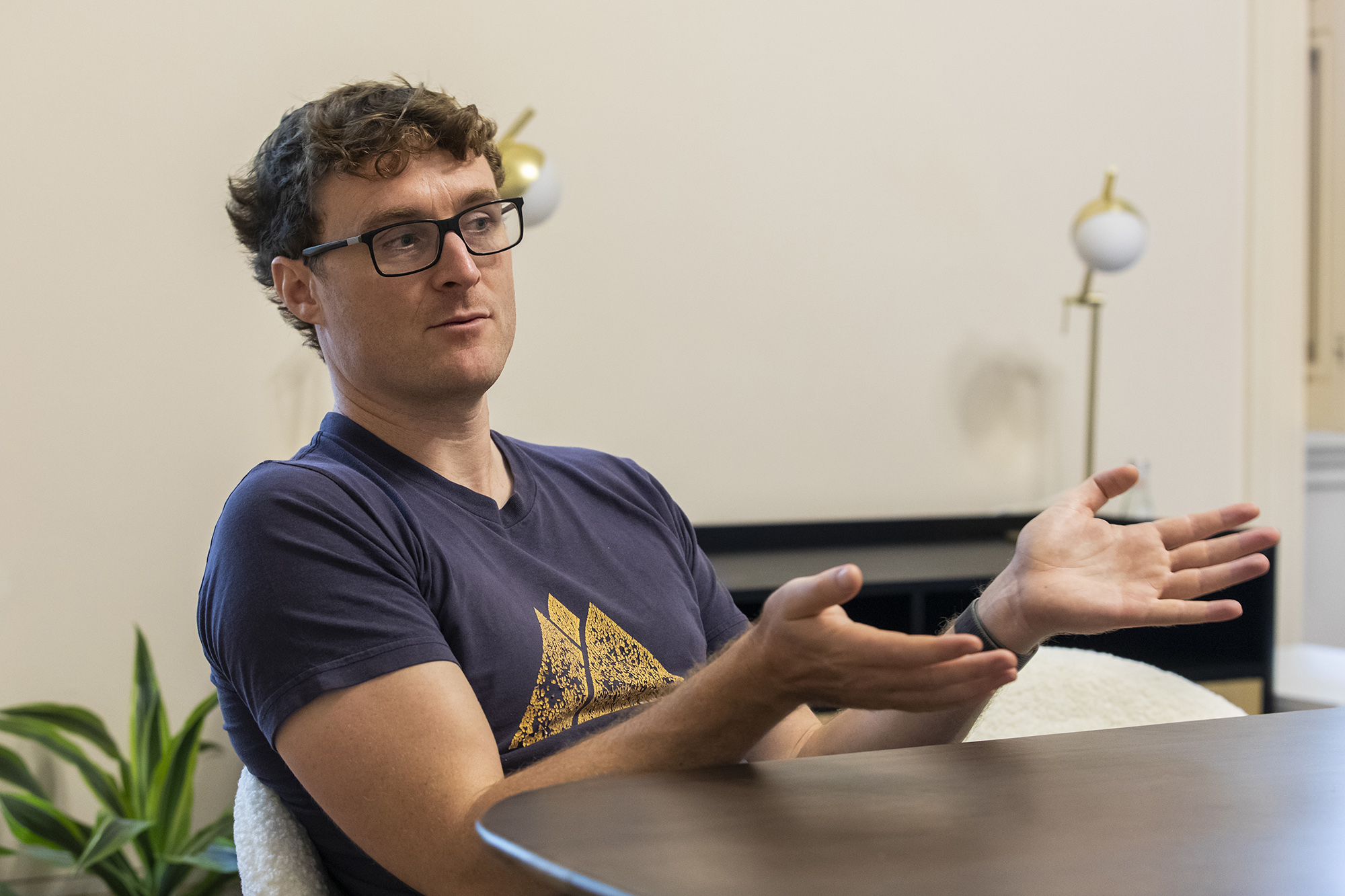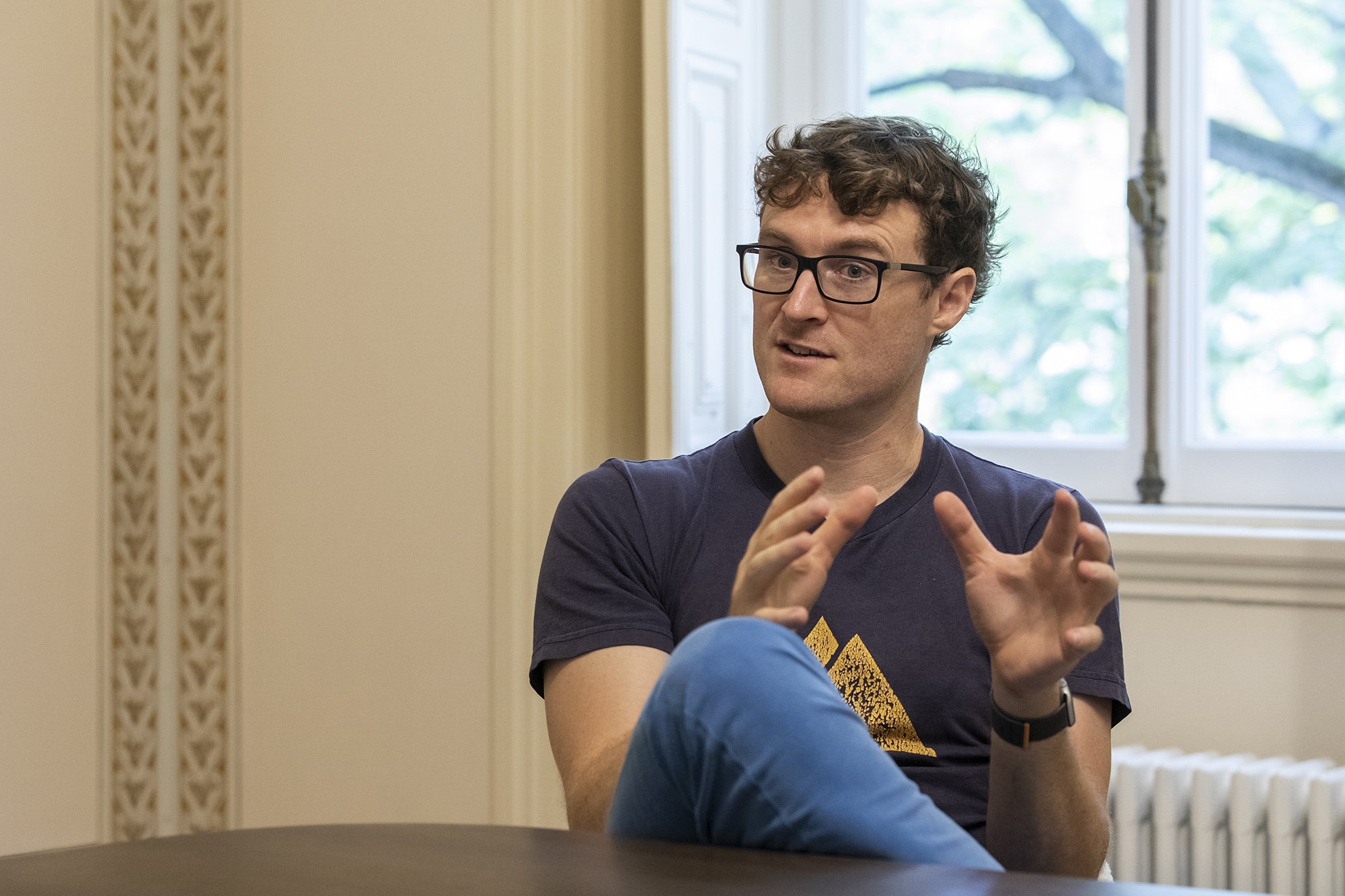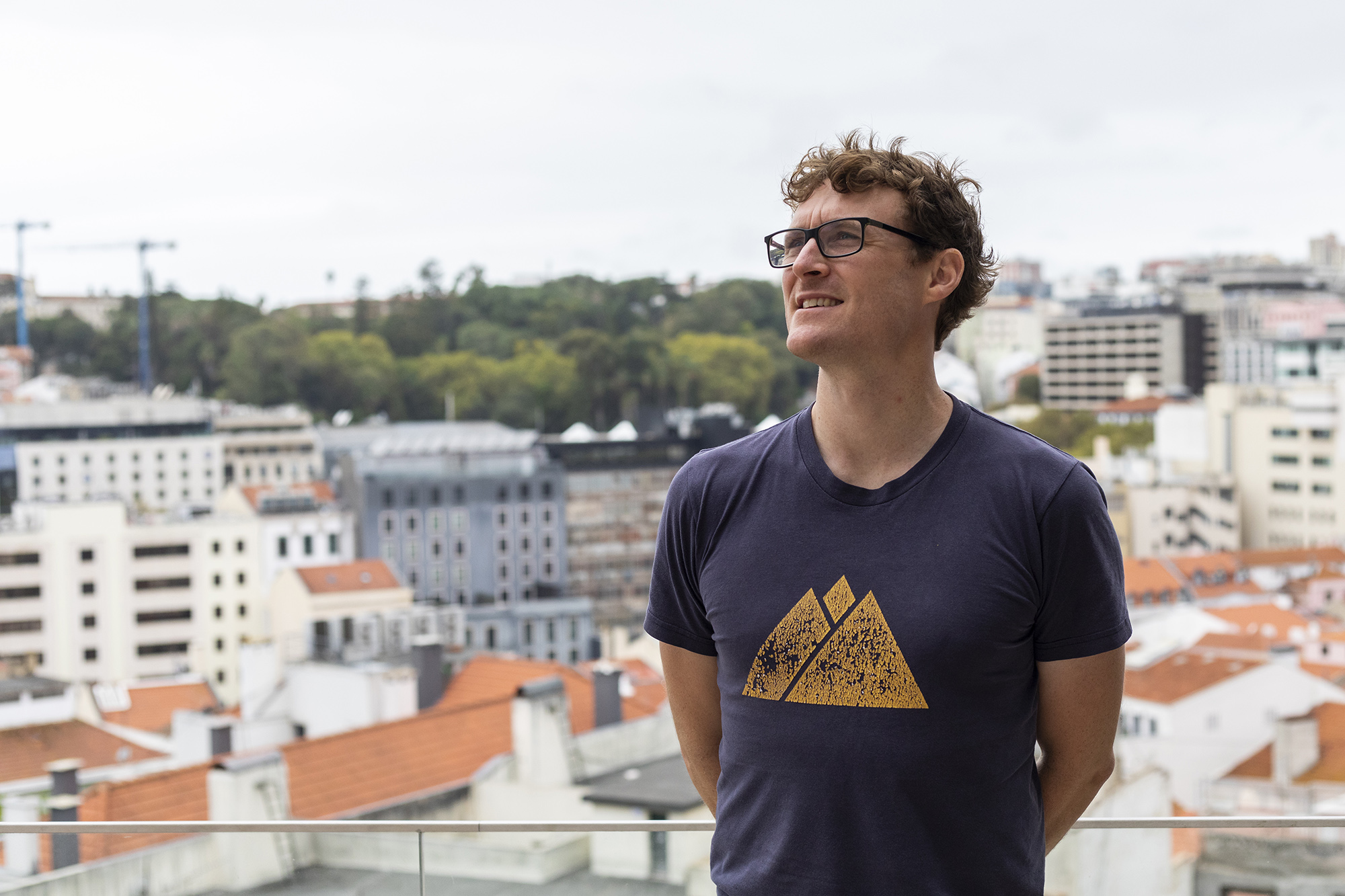The CEO of the Web Summit, Paddy Cosgrave wants to take the summit to the Middle East, Africa, Hong Kong or Beijing. Lisbon's protagonism will not be lost, he guarantees.
The Web Summit has the ambition to reach various continents. In May next year, it will hold its first summit in Rio de Janeiro, and the CEO wants to take the project to the Middle East and Africa. The plans include the first events in Hong Kong and Tokyo in 2024. And Paddy Cosgrave also has Beijing in his sights. The competition will not remove Lisbon’s status as the “biggest event”, says the summit’s founder. On the contrary, participation will increase, he states.
The Irishman considers Lisbon is much more dynamic than Spain. “Right now, Spanish innovation ministers must be getting slapped around. Pedro Sanchéz must be wondering how it is that Spain, which was dominant over Portugal in all categories, is being completely beaten by Portugal,” he says between laughs.
The Lisbon Unicorn Factory, the project inaugurated Thursday by Carlos Moedas and which follows the model of Paris’ Station F, can help Lisbon’s ecosystem of startups and scale-ups but the CEO of the Web Summit, whose seventh edition kicks off on 1 November, considers that the most important thing is to support small and medium-sized enterprises. “A unicorn factory is great, but I think we need an SME factory.”
Paddy Cosgrove says: “we are in a golden age for whistleblowers and investigative journalism” and acknowledges that the invitation extended to Grayzone, a website that gives the stage to conspiracy theories and disinformation, “was a mistake”.
They already have an event in Canada, Collision, in May next year, which will debut at the Web Summit in Rio de Janeiro. Will Lisbon remain the main summit?
Yes. All these events are regional. When we announced Tokyo in Japan as our first regional event, everyone was incredibly excited, and when we announced Rio de Janeiro, everyone in Portugal was ‘oh my god’. Lisbon will still be by far the biggest event. We originally planned the Rio event to be a 5,000 event next year, but we think it could be a 10,000 event. There is a great interest in Europe, North America, and Portugal, in particular. Brazil is an important market for so many companies here in Portugal. For Brazilian companies, Portugal has historically been the gateway to Europe, where they haven’t had much presence or success. I think that’s changing, and there’s a new generation of companies, particularly technological ones, who see no reason why they can’t conquer Europe. And the route to Europe is, naturally, through Portugal. It is the first place where they open their European headquarters. I think it will be a fantastic relationship.
They are expecting the largest Brazilian mission ever in Lisbon, the summit that precedes the one in Rio de Janeiro. Is this a growth that you believe will continue in the next events?
I think it will continue. If we go to Africa and the Middle East, participation will increase. Before Web Summit was known in Europe, we would go to every city and hold a half-day event, a mini Web Summit. To have people willing to go to Web Summit, they had to know what Web Summit was. Now Web Summit is incredibly well known in Europe and North America and our attendee base is dominated by these groups. But some of the fastest growing markets in the world are outside of Europe and North America right now, and we think those people should be at Web Summit. The way to do that is to repeat what we did across Europe a few years ago.
China is a market of 1.3 billion people, just like India. There’s no reason why we shouldn’t have a regional Web Summit.
You mentioned Portugal’s interest in the Rio Summit. Do you have any mechanism with the government, Startup Portugal or Startup Lisbon to bring Portuguese startups or companies to the Rio summit?
We will. We already have with the Portuguese government and various agencies to bring startups and other delegations to Collision, our event in Toronto.
Do you already have a date for Tokyo?
It is very dependent on the end of the restrictions in Tokyo. I don’t expect it to be before 2024. We expected to do the event in September 2021, but the government asked us to take a break. After the Olympics, they had a very significant outbreak and several politicians, including the prime minister and the mayor of Tokyo, resigned. Until Japan is ready again for international events, we will not return. Hong Kong is starting to reopen, and we don’t have enough time to do the event in 2023, so it will be in 2024. The speed at which Europe and America reopened was much faster.

Yes. Tokyo may be in September 2024, but it might be until 2025. And, in due course, we might do an event in Beijing.
“In due course”? Can you be more specific?
First, we go to the Middle East and Africa and then I would like to do something in Beijing. China is a market of 1.3 billion people, just like India. There’s no reason why we shouldn’t have a regional Web Summit. China’s participation was very strong until 2019 when the pandemic and the trade war effectively reduced it to zero. I hope [that there will be that opening] after listening to Olaf Scholz last week, who has a strong conviction that Europe’s position is one of multilateralism and keeping the world as open as possible, and not dividing the world between an American and a Chinese sphere. Europe feels that it wants to be a bridge between these great powers.
we have too many people working in Portugal for the size of the office. It’s too small. We are looking for various spaces in the city but, ideally, I would like it to be in Beato.
Returning to Lisbon. Carlos Moedas, the mayor of Lisbon, said that the Web Summit “cannot be just an annual event” and announced a partnership with the summit for Unicorn Factory Lisboa. What exactly is your role in this project?
I would like, ideally, [like the offices] of the Web Summit to be in the Beato Creative Hub. That’s been our intention for several years, but the construction, because of the pandemic, was delayed. Right now, our office is in Anjos, and we have too many people working in Portugal for the size of the office. It’s too small. We are looking for various spaces in the city but, ideally, I would like it to be in Beato.
Is that the sum of your relationship with the unicorn factory?
There are many more things we can potentially do. In particular, before startups come to Web Summit, let them know is a space they can relocate for two or three months after the summit. This would radically increase the number of international startups based in Portugal. But right now, if we can believe the rankings, whether it’s digital nomads or remote workers working for a tech company, Lisbon, is the number one location in the world from which people want to work. There doesn’t seem to be any problem…
Back to the factory. The project involves attracting scale-ups to set up, through a soft landing programme. Will it be enough to have the ‘unicorn’ effect on the ecosystem?
I’m no expert but the Minister of Economy, António Costa (Silva), says that the contribution to GDP has increased significantly. Will a unicorn factory take value away from that? No. Could it increase it? I think it might. Carlos Moedas is very inspired by the impact of Station F in Paris, which had a profound effect on the city. Roxanne Varza, who runs Station F, was on Carlos Moedas’ innovation council, as was I. Carlos is taking something that has proven to work elsewhere and is cautiously replicating that. At the end of the day, policy designers try to find another city that has taken the risk in the first place, and if it works somewhere else, the likelihood of it working in another city is much higher than a completely new and unproven strategy. If it will work in Lisbon if it will contribute? I don’t see why not.

In any case, Lisbon – Portugal as a whole – still attracts much less investment than other countries.
It depends on how you account for the investment. If Apple keeps a billion euros in Ireland, parked in a bank account, and it stays until the end of the financial year without being repatriated, and if it appears in the 2023 accounts, this is seen as a billion in FDI [Foreign Direct Investment].
And actually, it shouldn’t be counted as an investment.
No. When the largest companies in the world have assets outside Ireland, without repatriating them to the United States – it’s a relevant, well-documented issue – it appears that Ireland has very high levels of FDI. And the same can be said for other low-tax jurisdictions. Sometimes you have to be careful about what real FDI is. A better metric might be job creation. One has to question what part of it went to high-wage jobs or low-skill jobs in call centres. If you look at an economic zone, for example, Porto or Lisbon, the jobs that are being created have to be relevant.
Right now, the Spanish innovation ministers must be getting slapped around [laughs]. Pedro Sanchéz must be wondering how Spain, which was dominant over Portugal in all categories, is being completely slapped by Portugal.
Still, are there steps that could be taken to improve the ecosystem? We are good at startups but not so good with scale-ups. We only have seven unicorns, only one with tax headquarters in Portugal.
How many unicorns does Spain have? I think it’s three! [in October, with Factorial, Spain raised the number of unicorns to ten, but the economy is five times bigger]. They have three! Of the ten on the Iberian Peninsula, seven are from the smaller country. How do you think Spain feels about Portugal being completely dominant in this space? Right now, the Spanish innovation ministers must be getting slapped around [laughs]. Pedro Sanchéz must be wondering how Spain, which was dominant over Portugal in all categories, is being completely slapped by Portugal. Do I think criticism of the government’s current policies is important?
Absolutely. They should seek to make them even better than they are. Unicorns are a metric. Far more important are SMEs. We can easily be distracted by the entrepreneur who wins the lottery and sets up a company worth 10 billion. But far more important than companies worth 10 billion are companies worth half a million, five million, and 10 million. Those are the foundation of the most robust economies in the world. Germany is a perfect example. What would I do? I am in favour of community banking. I don’t know if community banking is part of the banking system in Portugal. The German community banking system is at the heart of the economy’s success. A unicorn factory is great, but I think we need an SME factory.
I imagine inflation has impacted the organisation. How has it affected ticket prices, and the amount charged to businesses?
Portugal, unusually, seems to have the most diversified energy production mix in Europe. I don’t know if it was accidental or if it was a visionary decision by a minister. Someone made a very intelligent decision. Still, I might share the energy bill the week after the event (laughs).
You had to raise ticket prices.
A little. Not in the initial stages of the sale, but with demand outstripping supply, we raised prices more quickly. We put very cheap values at the beginning; they cost half or a quarter of that at the end. The speed with which we increased it was the highest ever because we saw it would sell out.

Will you increase next year as well?
Yes, maybe. We don’t want them to sell out until literally the day before. From a business perspective, it makes sense to have 5% to 10% of tickets available until the day before, for people who can pay 600 euros to come to Lisbon. You could say we got the prices wrong because we didn’t expect the depth of demand. You will notice when you are in the venue. It’s going to be crazy crowded.
They withdrew their invitation to Grayzone, which is considered a disinformation website, and publishes fake news. In recent years, Web Summit has put the spotlight on the problem of fake news and misinformation. Why invite this platform?
It was a mistake. We listened to our attendees and speakers. I always try to stretch the boundaries. When I was at university, I was part of a debate. I invited jihadists to speak at the university, later arrested and taken to Guantanamo Bay [US detention centre on the island of Cuba] for participating in terrorist acts. I take a very broad view of press freedom.
But where do you draw the red line? Doesn’t a website that disseminates conspiracy theories and disinformation cross that line?
Sure. That may be the case. Sometimes our job is to get into difficult spheres. We put a lot of whistleblowers on stage. Are we criticised for that? Of course, we are, by many people. We had Edward Snowden. Do we suffer pressure from big governments? Of course, we do. We put the president of Huawei on the stage. Did we get pressure from big governments? Of course, we did. We put the White House CTO [Chief Technology Officer] on stage and the next day the Chinese foreign minister called a press conference in Beijing to say it was shameful to let the White House CTO, without being confronted, spread disinformation. We had Juan Branco, Julian Assange’s lawyer, speaking. Were there governments that expressed the view that this man was spreading disinformation on stage? Absolutely. Did our audience feel that what he was saying was credible? Most thought so, and they had a very positive reaction. We try as much as possible to go to the fringes of what is acceptable and sometimes we cross the line. In this case, we listened to the participants.
We try as much as possible to go to the fringes of what is acceptable and sometimes we cross the line. In this case, we listened to the participants.
You mentioned Snowden, last year it was Frances Haugen being at Web Summit, this year it will be Mark McCann, former head of Uber. Web Summit is becoming a mini-summit of whistleblowers. In this attempt to go to the fringes, you considered inviting the Portuguese Rui Pinto…
I can answer that question directly. In Ireland, England, France and Germany we find whistleblowers, on a national level. And they may expose some more international issues, but they are not Facebook or Uber. They are not companies that are in four or five countries, but practically in every country in the world. We run an event that brings people together from all over the world. From an editorial point of view, and I’m not on the editorial committee, when we bring whistleblowers from platforms I think it’s important that they have a global story.
Rui Pinto released the data from Football Leaks and Luanda Leaks.
We are in a golden age for whistleblowers and investigative journalism. I can reference that in Ireland. I am by far the biggest funder of investigative journalism in Ireland. Some projects are investigating very important issues relating to old crimes in politics and business, involving top figures in Ireland. It has triggered several investigations, criminal prosecutions, and resignations of ministers. I don’t think it would be possible if we didn’t live in a world where sharing information confidentially as a whistleblower is much easier and reporting is much easier. It’s not always (it is) within traditional media organisations, because they have a lot of stakeholders to answer to, but we have more and more very small projects, of two people with laptops, who publish very significant stories. It’s very difficult for those in power to stop two journalists with a website. They are 30 years old. The politicians can’t do anything. There is no one to call. There’s no one to sue because they don’t have money. In Ireland, the most recognised one is run by two former Web Summit employees, with people trained in law. The political advisers say, “this is illegal, you can’t publish it”. And they reply, “I have a lawyer”.